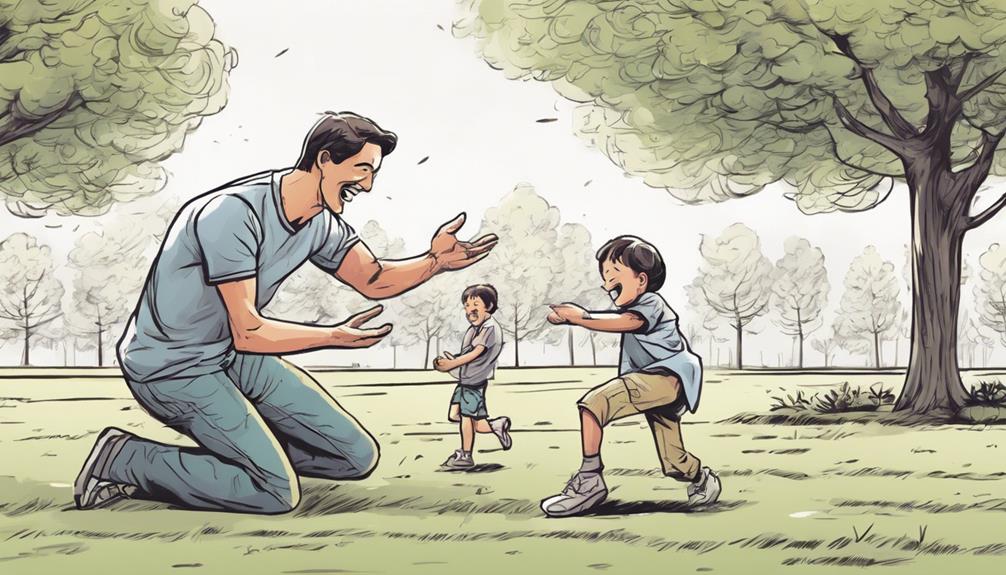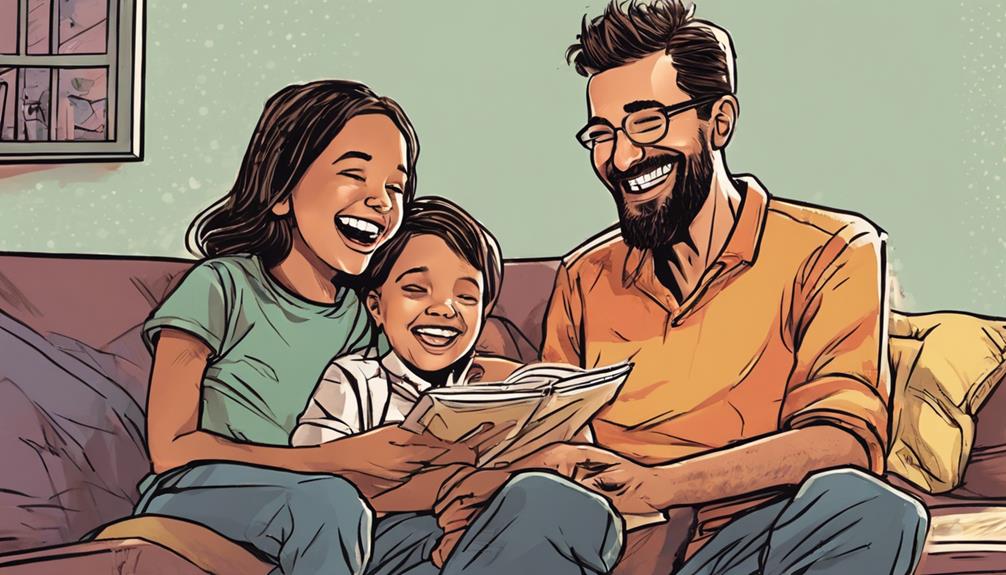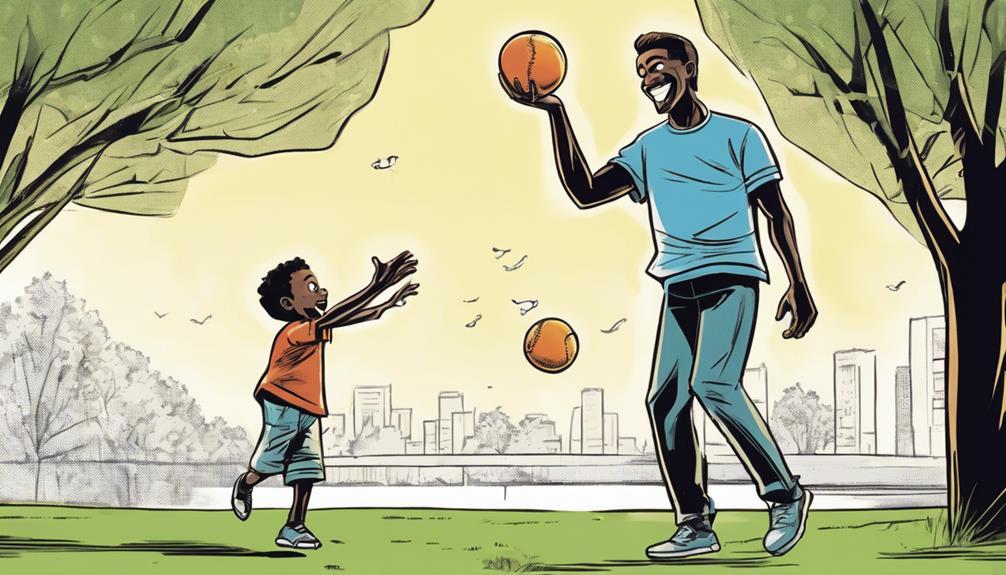Recent research from the University of California indicates that dads report higher levels of happiness and well-being in their parenting roles compared to moms. Factors such as time spent engaging in playful interactions and enjoying parenting tasks contribute to fathers' fulfillment. Dads often express deep satisfaction and connectedness through their involvement in parenting responsibilities. Despite facing challenges like societal expectations and work-family balance, dads find joy in their roles. With an evolving parenting landscape where men increasingly share parenting duties, dads are actively seeking resources and support. Learn more about the varying dynamics of parental happiness and well-being.
Key Takeaways
- Dads experience higher well-being from parenting than moms, per a University of California study.
- Factors include time spent playing with children and enjoyment from parenting tasks.
- Dads engage more in playful interactions, enhancing fulfillment.
- Enjoyment of parenting tasks contributes significantly to dads' overall well-being.
- Fathers find joy in playing with children, fostering satisfaction and connection in fatherhood.
Study Findings on Parental Well-Being
In a thorough study conducted by the University of California analyzing 18,000 individuals, findings revealed that dads experience higher levels of well-being from parenting compared to moms. This increased happiness among fathers can be attributed to factors such as the time spent playing with their children and the enjoyment derived from fun parenting tasks.
The study included measures of happiness, well-being, depressive symptoms, psychological satisfaction, and stress levels. It was found that dads tend to engage more in playful interactions with their kids, potentially contributing to their overall sense of fulfillment and satisfaction in their parenting roles.
This insight sheds light on the unique dynamics of parental well-being between fathers and mothers, highlighting the significance of active involvement and enjoyable interactions in enhancing paternal happiness.
Dads' Enjoyment of Parenting Tasks

Dads show a noteworthy preference for and enjoyment of engaging in various parenting tasks, fostering a sense of fulfillment and connection in their role as fathers. Studies show that fathers often find joy in activities like playing with their children, engaging in fun parenting tasks, and spending quality time with their kids. Unlike moms who may experience more stress and fatigue, dads tend to relish these moments, feeling a deep sense of satisfaction in their parental responsibilities.
This enjoyment of parenting tasks contributes significantly to dads' overall well-being and happiness, highlighting the unique fulfillment that fatherhood brings. Despite facing challenges such as parental guilt and rigid work expectations, dads find immense pleasure in the daily interactions and experiences they share with their children.
Dads' Satisfaction and Connection With Parenting

Fathers exhibit a profound sense of fulfillment and emotional closeness in their parenting roles, fostering strong connections with their children.
- Dads often report greater satisfaction and connectedness than non-parents.
- Nearly half of dads find parenting enjoyable all the time.
- Being a parent holds immense importance for both dads and moms.
- Children notably contribute to parental happiness amidst struggles.
Challenges Faced by Dads in Parenthood

Tackling the complexities of parenthood presents unique challenges for many fathers. Dads often face societal expectations, balancing work demands with family time, and overcoming stereotypes that depict them as less involved parents. The following table highlights common challenges encountered by fathers in their parenting journey:
| Challenges Faced by Dads | Description | Impact |
|---|---|---|
| Societal Expectations | Pressure to be the primary breadwinner | Strain on mental health and family dynamics |
| Work-Family Balance | Juggling career responsibilities and childcare duties | Stress, guilt, and potential burnout |
| Stereotypes | Assumptions of fathers being less nurturing or involved | Difficulty in expressing emotions and bonding with children |
These challenges contribute to the complexities dads face in parenthood, requiring them to navigate various obstacles to be actively engaged and supportive parents.
Dads in the Changing Parenting Landscape

Adapting to the evolving dynamics of modern parenting, male caregivers find themselves adjusting to a changing landscape that demands increased involvement and flexibility.
- Men are increasingly taking on equal parenting responsibilities.
- Flexible work arrangements are becoming more common to support active fatherhood.
- Dads are seeking out resources and communities for parenting support and guidance.
- Society is recognizing and valuing the crucial role of fathers in child-rearing.
Frequently Asked Questions
How Do Dads Balance Work and Parenting Responsibilities Effectively?
Dads effectively balance work and parenting responsibilities by prioritizing quality time with their children, engaging in enjoyable parenting tasks, and acknowledging the importance of fatherhood. They work hard to manage parental guilt and navigate societal expectations.
What Are Some Unique Ways Dads Bond With Their Children?
Dads bond with children through quality time spent playing, engaging in fun activities, and expressing satisfaction in parenting. Fathers find fulfillment in being actively involved, fostering connectedness, and prioritizing the importance of their role in their children's lives.
How Do Dads Navigate Societal Expectations of Fatherhood?
Dads navigate societal expectations of fatherhood by embracing their unique parenting styles, fostering deep connections with their children through activities they enjoy, and balancing work demands with family time to prioritize their role as involved and nurturing fathers.
What Strategies Can Dads Use to Overcome Parental Guilt?
To overcome parental guilt, dads can practice self-compassion, prioritize quality over quantity time with children, seek support from other parents, set realistic expectations, and engage in open communication with their partner. Embracing imperfection and focusing on positive experiences can alleviate guilt.
How Do Dads Adapt to the Evolving Roles of Fathers in Modern Families?
Dads are adapting to evolving roles in modern families by embracing active parenting, enjoying fun tasks with children, and prioritizing quality time. They find fulfillment in the significant role of fatherhood, despite facing challenges.
Conclusion
In the intricate tapestry of parenting roles, fathers emerge as the unsung heroes, finding happiness and fulfillment in the everyday moments of fatherhood.
As they navigate the challenges and joys of raising children, dads create lasting memories and meaningful connections that enrich their lives.
Fatherhood, with its unique blend of responsibilities and rewards, symbolizes a journey of growth and love, shaping men into devoted caregivers and cherished pillars of strength in the family unit.










